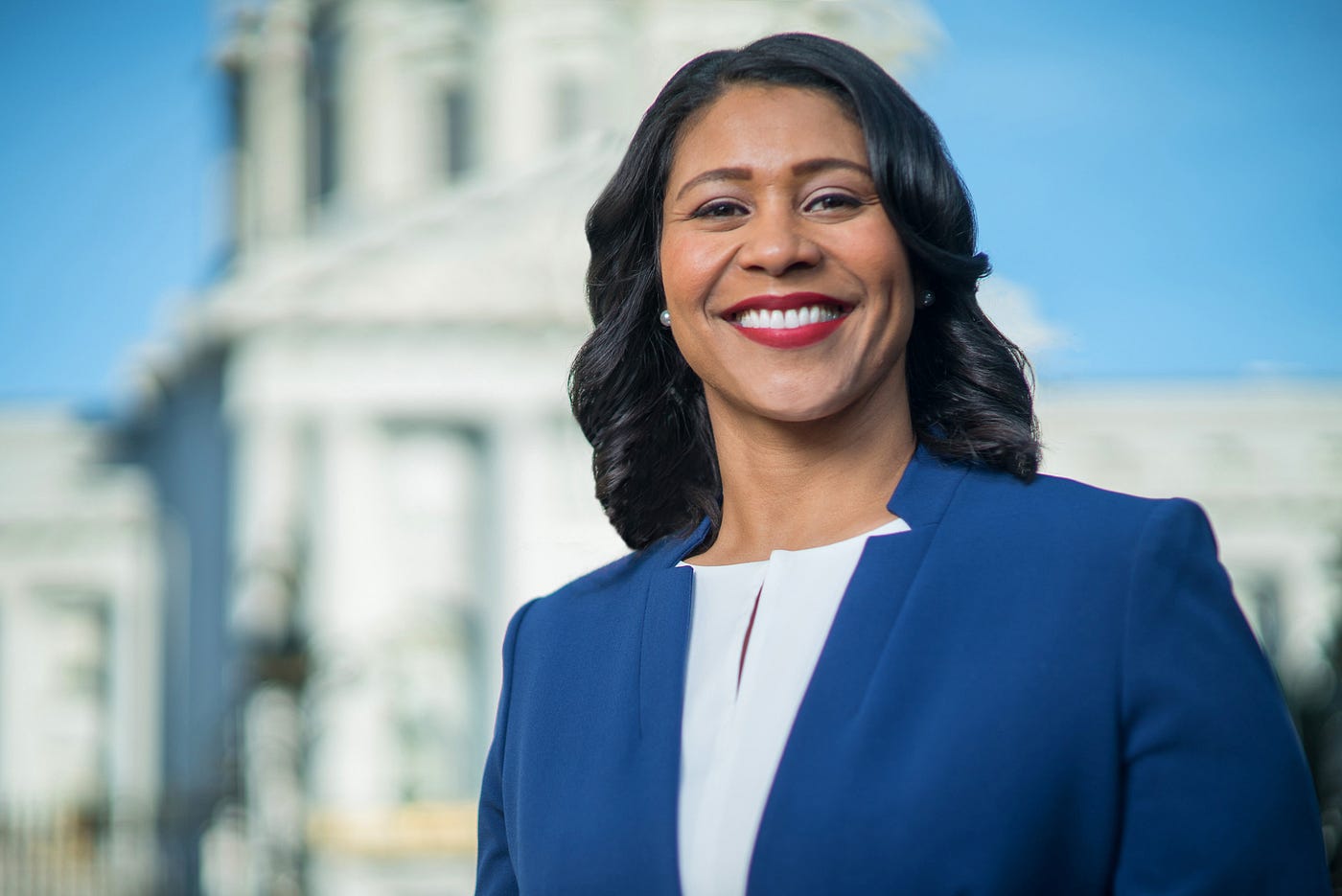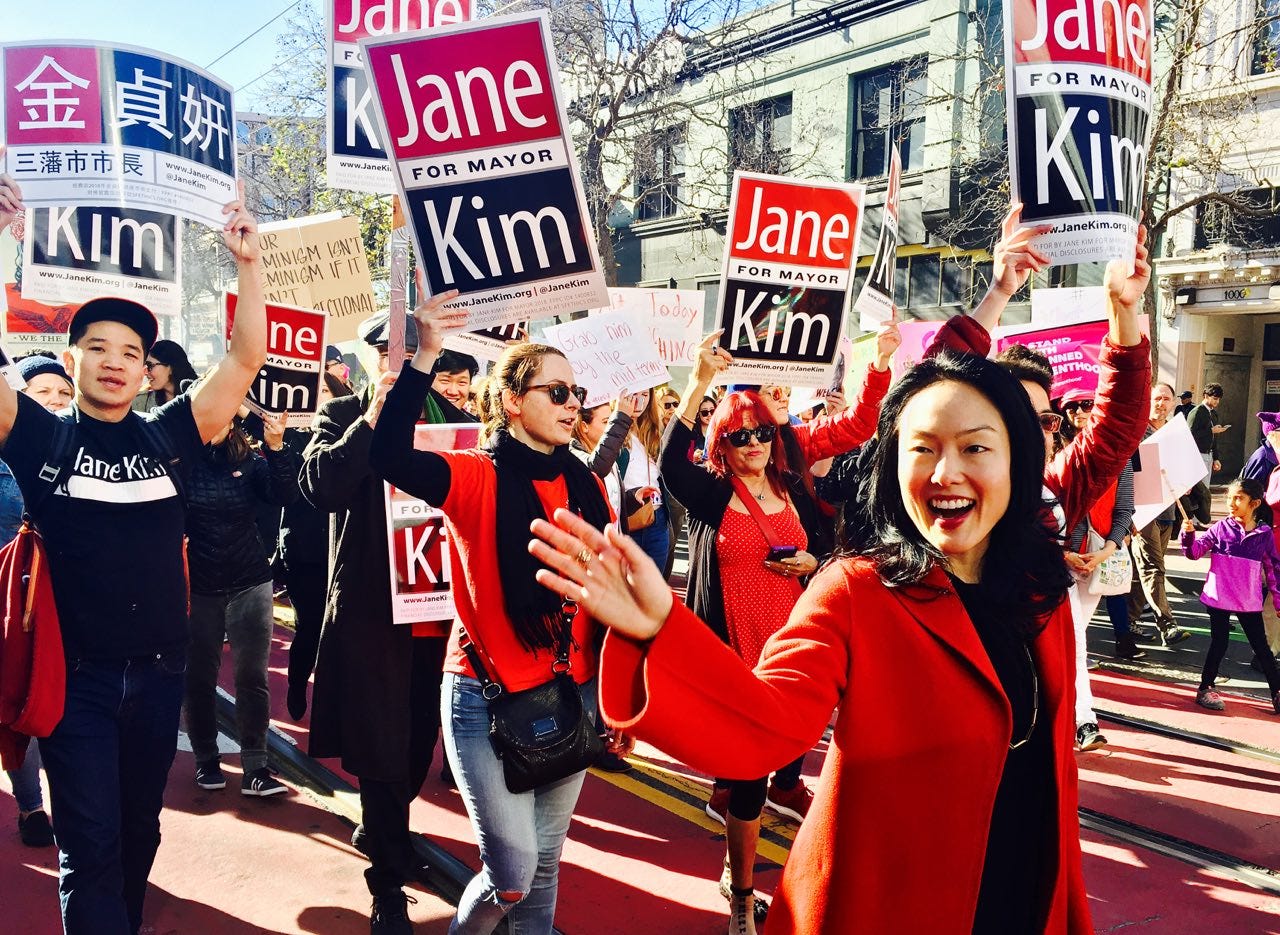
By Matt St John & The Bold Italic Editors
The San Francisco mayoral election is tomorrow, and by the time all is said and done, we’ll have the first African American woman, Asian American woman or openly gay man serving as mayor. It’s a historic moment at a pivotal time for our city.
Each of the top candidates is a democrat and an experienced public servant, and all generally support key progressive issues such as remaining a sanctuary city and prioritizing solving the housing and homelessness crises. What sets them apart is more nuanced, buried deeper in the details. So while we’ve all been inundated with campaign ads and intrusive campaign-sponsored text messages for months now, how much do you really know about the names on the ballot?
If you need a last-minute cram session to get prepped for Election Day, we’re here to help you out. We’ve put together a helpful yet simple guide to give you a high-level primer on the three major candidates: London Breed, Jane Kim and Mark Leno. (We’ve chosen to narrow down the many candidates to the three considered most likely to win.)
Have a read through, and we’ll see you at the polls.
London Breed

What’s her story?
In the span of a year, Breed has gone from being known mostly only by local political insiders to a household name. Following the sudden death of mayor Ed Lee last December, Breed — who at the time served as president of the Board of Supervisors — assumed the acting-mayor seat as allowed by the city charter. It was a big moment in SF history, as she was the first African American woman to ever assume the role.
But she remained in the position for about only a month before, to the shock of many, she was ousted by her fellow supervisors, who voted to replace her with a wealthy white man, Mark Farrell. The move garnered immediate backlash, national media coverage and even tweets from Snoop Dogg. She now stands a real shot at being the first African American woman mayor and is generally considered the front-runner in this election. But aside from this controversy, what else do we need to know about her?
To start, Breed is the only SF native of the top candidates and has experienced firsthand the city’s housing crisis. Raised by her grandmother in Plaza East public housing in the Western Addition, she found out that the housing development would be torn down when she was in her early 20s as a part of an “urban renewal” taking place in the 1970s. Her grandmother was still living there at the time, and Breed traveled back to SF from UC Davis, where she was studying, often to help.
“It was very stressful—we didn’t have a lot of money, clearly, and I missed some classes trying to help figure things out,” Breed told The Bold Italic, noting that the family eventually found housing in a cramped three-bedroom to fit her, her aunt, her grandmother and one of her brothers.
After receiving a master’s degree in public administration from the University of San Francisco, Breed spent her career serving the city working on issues like housing, the environment and transportation. She’s been behind the scenes in local politics since the early 2000s, first serving as executive director of the African American Art & Culture Complex and then moving on to multiple policy units, from the San Francisco Redevelopment Agency to the Fire Commission. Then in 2012, she took District 5 in a win against an incumbent supervisor, an outcome the Chronicle called an “election shocker.”
What does she stand for?
Like the other candidates, the housing crisis is top of mind for Breed, but she takes a different approach to the issue than her fellow two candidates. While she’s often shown that she’s tenant friendly, she believes more in letting the market fuel the approach to housing rather than overloading on government intervention.
Overall, Breed believes the crisis is primarily driven by a lack of housing supply across the board—affecting not only low-income but also middle-income people as a result of what she calls decades of bad housing policy. “From 2010 to 2015, San Francisco created eight jobs for every home we built. Yes, eight jobs for every home. That’s illogical, unsustainable policy, and rents have skyrocketed as a result,” she wrote on Medium.
To get a better sense of where Breed stands on housing, just look at SB 827, a recent controversial housing bill in the California legislature authored by state senator Scott Weiner that would have loosened height and density restrictions on buildings close to trains or subways. This would have been a boon to developers, making it easier for them to build apartments and condos by getting around local building restrictions. The bill was largely unpopular with SF’s Board of Supervisors, who voted 7–3 to publicly oppose it. But Breed went against the pack, voting to support seeing where the idea could lead—which tells us a lot about her willingness to consider market-driven approaches to the problem.
Other issues close to Breed’s heart include ameliorating the city’s transportation system so that it works for everyone and making housing more affordable. But she’s particularly inspired to improve the city’s education system. Just check out this Medium post.
Who are her supporters?
Breed is generally considered a moderate democrat, compared to Leno and Kim, who are starkly progressives. Her approach to housing has won fans among developers, building owners and coalitions like the Community Alliance for Jobs and Housing. She’s also received support from many in the tech industry, including Medium’s Evan Williams and Gayle Conway, wife of angel investor Ron Conway.
Breed recently won the endorsement of the San Francisco Chronicle, which writes that out of all the candidates, “Breed has been most pronounced in acknowledging that the affordable-housing problem is not going to be cured by City Hall mandates alone.”
That’s the same reason groups like YIMBY (Yes in My Backyard) support her, while more “pro-tenant” groups, such as the San Francisco Tenants Union (SFTU), oppose her. For those not highly versed in SF’s housing debate, “YIMBY” groups generally believe that tenant-protection laws — such as inclusionary housing — are only a Band-Aid for a much bigger wound.
Who isn’t a fan?
Most of the city’s progressives, for one. From the city’s “pro-tenant” groups to its more left-leaning supervisors, many argue that Breed has saddled up too much with San Francisco’s wealthy elite, from its tech titans to its landlords and real estate developers.
In a dramatic speech at City Hall on the night of Breed’s unseating, fellow supervisor Hillary Ronen alleged that the Bay Area’s tech sector had been campaigning for her behind the scenes. The SFTU has also endorsed both of Breed’s opponents, arguing that she’s repeatedly opposed issues that the pro-tenant group supports, like full regulation of Airbnb.
Breed has also been absent in discussions about the Midtown Park Apartments, a housing complex in Breed’s district that — due to its convoluted status — is not protected by rent-control laws. In 2015, the Chronicle reported that some of its residents faced rent hikes of up to 300 percent, leading to a public dispute that continues today.
Final tidbit
She once photobombed Chris Rock on live TV after a big Warriors win. That’s hometown pride.
Jane Kim

What’s her story?
Kim is a Green-Party-turned-democratic-candidate currently serving as an SF supervisor. She’s a strong progressive who bills her campaign as the “resistance,” with the tagline“This is our city. Let’s take it back.”She’s served on the Board of Supervisors since 2010, when she was elected to represent District 6 (the Tenderloin, SOMA and Treasure Island). If elected, she would be the first Asian American woman to be mayor of SF.
Kim grew up in New York City, the child of Korean immigrants. Her dad worked during the day and went to law school at night, while her mom owned a women’s clothing store in Manhattan, where Kim spent a lot of time. “It was my after-school program and my summer camp,” Kim told The Bold Italic, adding that it was while riding the bus between her home and her mom’s store that she first started to notice New York City’s homeless population, an experience that sticks with her today.
She moved to the Bay Area to study at Stanford University and later at the UC Berkeley School of Law. Her career began with a policy fellowship at the Greenlining Institute, an Oakland-based group that advocates for communities of color around California. After that, she worked for six years as a youth and family organizer for the Chinatown Community Development Center as an organizer. “That’s really where I cut my teeth in San Francisco politics,” Kim said.
In 2006, she won her first elected position on the SF Board of Education, eventually becoming its president in 2010, where she gained a reputation for being able to work with her more conservative colleagues to get things done. Her work on the board ranged from selecting a superintendent to tackling the school-selection process to give families more say to joining with other board members in an attempt to phase out JROTC programs in local schools.
What does she stand for?
Kim is a staunch progressive. She had Bernie Sanders’s endorsement in her close — but ultimately failed — bid for state senator in 2016. She disagrees that the private sector should be the sole provider of the public’s benefits. And she’s a devotee of city programs, from the initiative she’s cosponsoring to expand child-care subsidies for low-income residents to making San Francisco City College free for all residents.
“San Francisco has this really unique opportunity in this nation today because we’re not only a liberal city; we’re also a wealthy city, which means that we can afford to enact these dream policies that other municipalities can’t even fantasize about,” said Kim.
Those values carry into her stance on housing. Kim believes it’s the government’s responsibility to mitigate these problems, not just leaving it up to market forces. She’s likely the most pro-tenant candidate in the bunch. She supported the speculator tax and authored the Evictions Protections 2.0 package of bills. Between 2006 and 2015, more affordable housing has been built in her district than in all the other districts combined. While some of those units were built before she was in office, Kim has said those numbers wouldn’t be as high without her.
In addition to housing, her core issues include standing up for immigrants, prioritizing cleaner streets, addressing traffic congestion and reinvesting in Muni.
Who are her supporters?
Kim is backed by most left-leaning progressives and pro-renter groups. She is a notorious negotiator when it comes to real estate developers, a recent example being the San Francisco Giants’ plan to build a massive commercial and housing complex next to AT&T Park. By the end of the negotiations, which Kim was centrally involved in, the baseball team agreed to make 40 percent of the development’s 1,600 housing units below market rate.
“She led the effort at the table to fight for greater public benefits for a much higher level of affordable housing,” said former San Francisco supervisor John Avalos. “It was really great to see her lead the table.”
Her strict negotiating and support of tenants’ rights has also earned Kim the support of pro-renter groups like the SFTU, which has endorsed both Kim and Leno. As mentioned, back in 2015, Kim has been a champion of renters, including the Evictions Protections 2.0, which made it more difficult for landlords to evict tenants for minor lease infractions, such as an occasional noise complaint, and made it impossible for landlords to evict tenants for adding more roommates, even if the additions were outside the original rental agreement.
Who isn’t a fan?
San Francisco’s more moderate groups, for one, who aren’t taken to her ultra-progressive approaches without, what they say, is a consideration of larger factors. Take her Child Care Initiative Project. While it would help ease the financial burden carried by low-income San Francisco families, it would be funded by raising the commercial gross receipt tax by 3.5 percent, according to the San Francisco Examiner, a fact that some members of the city’s business community are not happy about.
“I think Jane Kim putting a gross receipt tax on the ballot in June [2018] for childcare, without really outreach to the taxpayers or the business community, would be an indicator that that’s not somebody that’s going to make it easy to work with,” said Jim Lazarus, the senior vice president of public policy at the San Francisco Chamber of Commerce.
Moreover, Kim has earned the ire of some of the city’s prodevelopment and YIMBY bloc, who say her hard-won affordable-housing benefits are coming at a price: they slow down the city’s rate of development.
Final tidbit
She has a black belt in tae kwon do. And that’s pretty badass.
Mark Leno

What’s his story?
Leno is a seasoned California state politician who is the first openly gay man to have served in the California Senate (from 2008 to 2016) and hasn’t worked in San Francisco politics since the early 2000s. If elected, he would be the first openly gay man to serve as mayor of San Francisco.
Leno grew up in Milwaukee in a family of Russian ancestry and Jewish heritage. From a young age, he knew he was gay. “One aspect of my childhood was recognizing same-sex attraction at a very young age, which was not something accepted or encouraged in the 1960s,” Leno told The Bold Italic. Leno came out when he was 18 during his first few months away from home at college.
After attending the American College in Jerusalem, followed by two years of rabbinical studies at Hebrew Union College in New York City, he moved to San Francisco in 1977, living first in the Tenderloin and then moving to Noe Valley, where he still resides. He started a business called Budget Signs Inc., which he still operates today, and found the city’s atmosphere “exhilarating,” from the campaign of Harvey Milk — which would end in tragedy a year later — to the Castro’s growing queer scene. “It was the disco ’70s,” said Leno. “It was heaven on earth for a young gay man.” In 1990, he lost his life parter from AIDS-related complications.
His political career began on the San Francisco Board of Supervisors in 1998, a post that he held until 2002, when he successfully ran for the California State Assembly. Then, in 2008, he ran for the California State Senate, where he remained until he was termed out in 2016.
According to the LA Times, during his time as both a California assemblyman and senator, Leno authored 161 laws, including many that were groundbreaking, LGBT friendly and pro-tenant.
What does he stand for?
While he hasn’t worked in local politics for some time, legislation he’s authored at the state level has not gone unnoticed among San Francisco’s more progressive sect. Early during his tenure as an assemblyman, he authored a bill exempting single-room occupancies from the Ellis Act, closing what some claimed was a loophole for realtors.
Many others respected his leadership on the fight to raise the minimum wage to $15 an hour in California, as well as his support for LBGTQ issues. In 2005, he authored legislation that, according to the Washington Post, became the first attempt to get legalize gay marriage approved by a legislative body. However, after the measure passed the state senate, it was vetoed by Governor Arnold Schwarzenegger.
He’s coming back to San Francisco now with some pretty lofty goals, like ending street homelessness by 2020. That’s an issue that every San Francisco politician is generally inspired by, but Leno has positioned it definitively at the top of his platform. He’s also come out in favor of expanding the Navigation Center system, establishing a mental-health justice center and increasing foot patrols to crack down on car break-ins.
In general, Leno is seen as a progressive but who isn’t afraid to remain middle-of-the-road when needed. When it comes to how he would work with developers and affordability issues in the city, though, he’s more of a wild card than his two fellow candidates, since he hasn’t had to govern in SF in many years and hasn’t been overly up front about his views on specific issues he hasn’t had to vote on. For example, he’s been lukewarm on SB 827 but not explicit about his stance.
Who are his supporters?
Leno enjoys the official support of some pretty big names, like senator Kamala Harris and state assemblyman Phil Ting. Include Senator Scott Weiner in that list, too, though he’s split his endorsement between Leno and Breed.
Due to his clear pro-tenant work in Sacramento, Leno has also received support from the SFTU, which endorsed both him and Kim. “He took the realtors on directly, and won at least once, with the bill to limit SROs being Ellis-acted,” said Deepa Varma, STFU’s executive director. “He’s really been committed on that issue.”
Others have admired his strong LGBT stance and willingness to disrupt the status quo, like SF supervisor Hillary Ronen. “I’m an admirer of his based on his long, long career as a legislator and leader in the city,” said Ronen. “I’m particularly impressed that he was able to get some pretty controversial work done in Sacramento that has made a tremendous difference in San Franciscans’ lives.”
Who’s not a fan?
While Leno’s work on LGBTQ issues and housing has been popular in San Francisco, he’s not been without controversy. In 2009, he authored a bill that transferred the ownership of a 23-acre piece of Candlestick Point State Reservation Area from the state to the city, clearing it for development. The park lies in San Francisco’s Bayview-Hunters Point, a neighborhood that is currently being changed immensely by development.
“It was a time when we needed our allies to be allies — to be on our side. And he wasn’t,” said Mary Ratcliff, the managing editor of the San Francisco Bay View newspaper. The bill — which passed — was criticized heavily by the newspaper. This land is now being developed as part of a massive mixed-use development project on the site of the former Candlestick Park Stadium.
Also, while Leno’s work on housing is popular with the SFTU, it isn’t with the city’s YIMBY organizations. “He was working off of a playbook that was about ‘How do we get a little bit more affordable housing?’ and wasn’t really focused on how the entire housing market was falling apart,” said Laura Foote Clark, executive director of YIMBY Action.
Final tidbit
He works out—hard—often running in his neighborhood in Noe Valley or out at Fort Point along the bay. Healthy guy—that’s a plus.
Hey! The Bold Italic recently launched a podcast, This Is Your Life in Silicon Valley. Check out the full season or listen to the episode below featuring mayoral candidate and writer Broke-Ass Stuart. More coming soon, so stay tuned!







